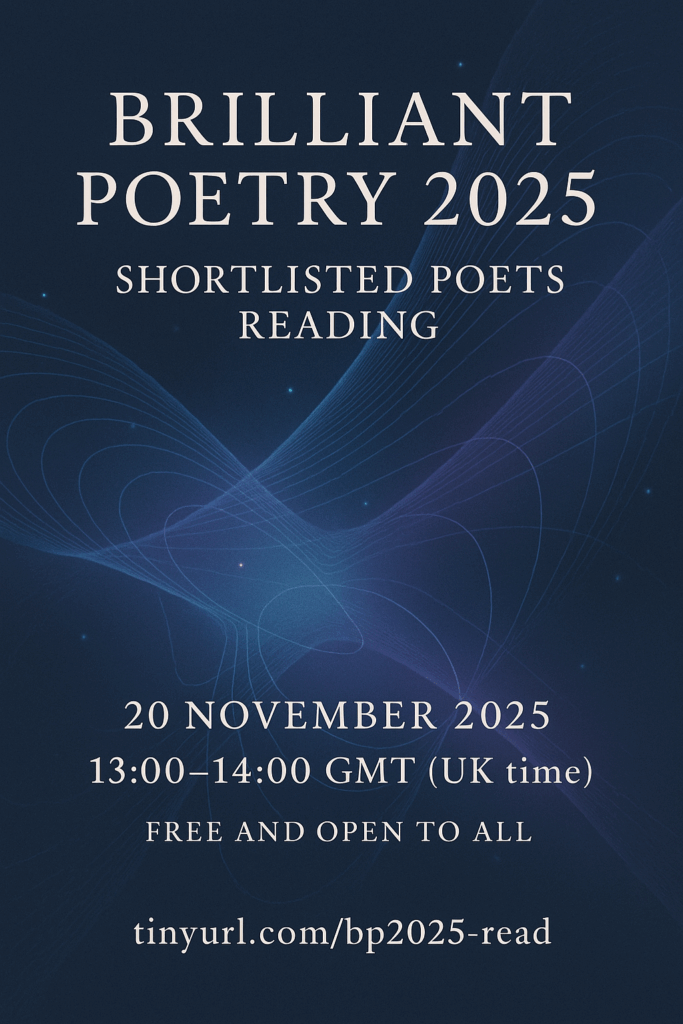Brilliant Poetry 2025 Winners Announced
Today, on World Science Day for Peace and Development, we are delighted to announce the winners of the 2025 Brilliant Poetry Competition.
This year’s theme celebrates the International Year of Quantum Science and Technology, marking a century since the foundations of quantum mechanics reshaped our understanding of reality. The competition invited poets from around the world to explore quantum science’s strangeness, beauty, and philosophical reach through verse.
From over 350 entries, our judges selected three poems that best reflect the meeting of art and inquiry, where precision meets wonder and uncertainty becomes a creative force.
First Prize: Spooky Action at a Distance by Gary Hugh Day
Day’s poem reimagines Einstein’s uneasy phrase through the quiet intimacy of human connection. Set within the familiar world of a Lowry painting, it reflects on entanglement not as abstract physics but as shared memory, a tenderness stretched across space and time. The imagery of parallel lives and ghostly closeness transforms quantum strangeness into something deeply human. Enjoy Day’s poem:
They had the same print
In their living rooms, Lowry:
Coming Home from the Mill, 1928.
And whenever they glanced
At this lost world,
They felt the familiarity
Of that other place
Which was also home,
Suffusing them with a sense
Of being in two places at once,
Unsure where each began
And the other ended.
She said they were the couple
On the bottom right, moving away
From the patchy crowd
With its comedy hats and boots,
Solo dances, simple mimes,
And pavement melodramas.
All gone, like the factories
The coloured wagon and
The open doors of terraced houses.
Once more his eye is drawn
To the couple heading out of
The frame; arms linked, in step,
And he wonders if she still
Feels this ghostly closeness,
The nearest they come to touching now.
Second Prize: An End to Time by Luisa A. Igloria
Igloria’s poem moves with a calm, contemplative rhythm, asking what it means to measure time in a world of unanswerable questions. Her lines evoke the steady motion of daily life while contemplating its eventual dissolution, as if entropy and eternity meet within domestic ritual. It is a poem of quiet revelation, in which the ordinary becomes infinite. Enjoy Igloria’s poem:
I like putting one foot in front of the other,
walking at a steady pace until I change
the speed on the treadmill or come to
the end of the half-hour. I like wiping down
the silver and putting them back in their
drawers, but not ironing out the creases
in a shirt. The child asks, is there
an end of time? It’s the kind of question
that can’t be answered. If we knew, the world
would be a different place entirely. If we knew,
all measures would be undone. Animals
would never come out of the sealed caves
of their hibernation. The last however many
years of heartache would dissolve like a golden
cube of honey in a glass of tea. The old queen
would leave the hive whenever she wanted to
without being followed by a swarm, without
having to scout for a new home to populate
with food and bodies; without the new queens
killing each other in order to be the only one.
Third Prize: Schrödinger’s Attic by Muizzah Fatima Munir
Munir’s elegy transforms the well-known thought experiment into a meditation on memory and loss. “Schrödinger’s Attic” holds grief in superposition, between presence and absence, warmth and void. The imagery of fading photographs and overlapping waveforms captures how memory behaves like a quantum state, both alive and unreachable. Enjoy Munir’s poem:
At this gathering, everyone’s smiling,
quietly reminiscing, mentioning you,
believing you still exist
only in their memories.
The album keeps gathering dust,
left unopened in Schrödinger’s attic.
I feel your presence—until I turn the page.
The half-faded photographs
never quite trapped your light.
My aunt sees you in my mother’s eyes,
your warmth felt in her love.
Everyone describes you with longing.
I wish for dreams where your waveform
might overlap mine.
While eating my mother’s dishes,
the ones you once made with love,
it feels as if I’m enveloped by your warmth.
Just when I think I’ve reached you,
you collapse into air,
a probability—erased.
Your smile lives on, when you yourself don’t.
Science and Poetry in a Quantum Year
The 2025 competition shows how science and poetry together can help us see the world anew. Quantum physics invites us to live with uncertainty, and poetry teaches us to find meaning within it.
Join us for the virtual reading of the shortlisted poets on Thursday, 20th November 2025, 13:00 to 14:00 GMT, free and open to all at tinyurl.com/bp2025-read.

For general questions about IYQ, please contact info@quantum2025.org. For press inquiries, contact iyq2025@hkamarcom.com.


